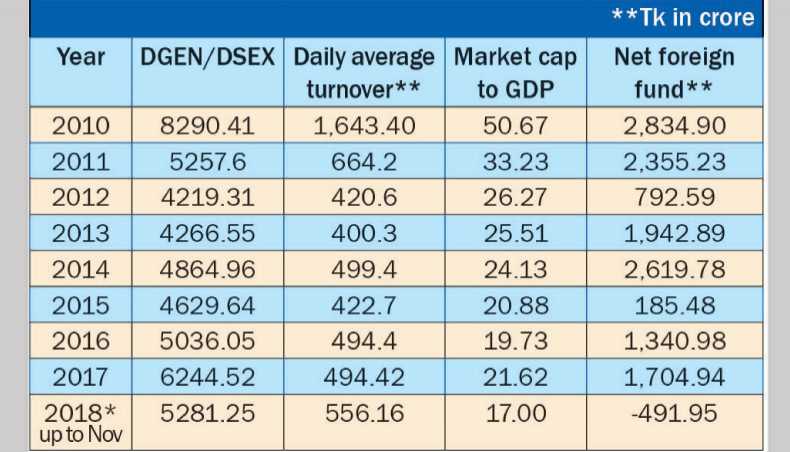Stockbrokers, investors lament 8yrs of market decay

Stockbrokers and investors have expressed their disappointment over the country’s capital market that has been suffering a downward trend since the year of market crash (2010-11), eroding the capital of thousands of investors.
Dhaka Stock Exchange Brokers’ Association expressed its dismay to the market regulator, Bangladesh Securities and Exchange Commission, through a letter on December 9 where it sought another three years for provisioning against unrealised losses of disbursed margin loans and dealer accounts.
In the letter, DBA said that the capital market was maintaining bearish mood and the key index of DSE fell by 3,600 points from 8,900 points in 2010, a drop of almost 40 per cent, and the average daily turnover declined by around 78 per cent in the period.
The situation is getting worse day by day and the daily trade volume came under Tk 550 crore in December this year from Tk 2,500 crore 2010, it also said.
‘High volatility is eroding the capital of thousands of investors,’ it said.
‘As we are in such industry where business growth solely depends on the trend of the market, we couldn’t avoid [the impact of] the extreme downward trend at the market,’ it said.
The association also said, ‘In the market dynamic, customer relies mostly on the banking sector whose performance at the capital market is the worst that hit the negative equity severely.’
The market suffered two crashes — one in 1996 and another in 2011. On both occasions, the ruling Awami League was in power.
Investors had run for exit after the market crash in 2011 with fear and anger and their confidence is yet to be recovered.
The big players behind the crashes are yet to be punished, which is one of the key reasons investors could not regain confidence in the market, market experts said.
They said that some policies and rules were reformed at the behest of BSEC chairman M Khairul Hossain after he joined the commission on May 15, 2011.
But financial crimes like frauds, market manipulations and insider trading are still occurring and companies’ transparency and corporate governance are weak.
The listed mutual funds have become a burden for investors as all the 36 mutual funds except three are being traded far below their the face value.
The capital market has failed go with the pace of country’s development with the gross domestic product hitting over 7 per cent every year.
Former adviser to an interim government Mirza Azizul Islam said that the stock market found its stability after coming down to the bottom stage.
He said the investors’ confidence in the market had not been recovered and investors’ awareness hardly increased.
He expected that confidence situation would improve in the coming days as the commission took some initiatives.
Mirza Aziz said, ‘All the closed-end mutual funds should be abolished as they could not perform well, and they behave like the retail investors in the market.’
He condemned the extension of tenure of the mutual funds by 10 years that hurt investors’ trust on the market.
Former BSEC chairman Faruq Ahmed Siddiqi said the regulators failed to control manipulations, especially whose involved some low-profile companies in the market that weakened confidence of investors.
So, the market has remained stagnant amid low turnover over the years, he said.
Market operators said that the primary regulators (bourses) and BSEC also failed to bring any Grameenphone-like large company to the market and introduce new products in the capital in the period, which was very much needed for the stability of the market.
DSE managed to make a Chinese consortium of Shenzen and Shanghai stock exchanges its strategic partner by selling its shares at Tk 947 crore to the group in September this year that increased the bourse’s reputation worldwide.
Investors are eagerly waiting for the strategic partner’s initiatives that might change the market trend, they said.
United International University professor and share market analyst Mohammad Musa said that the capital market of the country was very much unpredictable.
It could be such for the domination of retail investors in the market and the trend increased volatility, he said.
He said that investors were grappling with so many issues including market crash, election-centric instability in 2014 followed by political uncertainty for couple of years, financial sector woes and the election in 2018 in the 2011-18 period.
Mohammad Musa said that there was a lack of law enforcement in the capital market and the errant people got off scot-free that also provoked others to commit crimes.
He said that there was still very much potentiality of the market and the market might rebound after the general election scheduled for December 30.
Source: http://www.newagebd.net
Tags :
Previous Story
- Stocks keep falling for political jitters
- Dhaka stocks dip for 4th day on polls-centric...
- IMO Launches Phase II of Bangladesh Ship Recycling...
- Stocks drop for 3rd day as electioneering begins
- Dhaka stocks fall for 2nd day on banking...
- Financial scrips power stocks’ gain
- Net foreign investment at DSE negative in November
- Dhaka stocks rise sharply as financial scrips soar